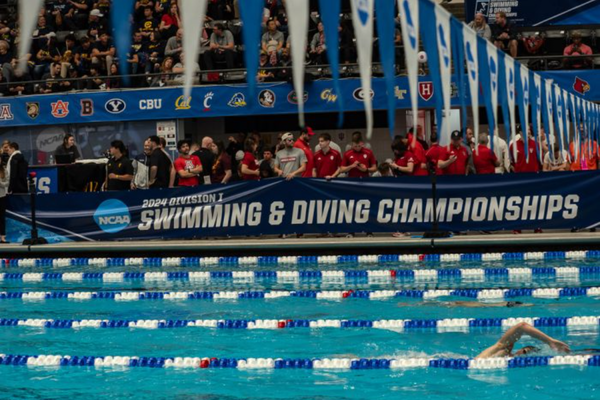
via Imago
Credit: X/ NCAA Swimming

via Imago
Credit: X/ NCAA Swimming
ADVERTISEMENT
Article continues below this ad
What’s your perspective on:
Did the NCAA's strict rules rob Florida of a deserved victory, or was the DQ justified?
Have an interesting take?
ADVERTISEMENT
Article continues below this ad
The Gators were disqualified due to an early takeoff by anchor
ADVERTISEMENT
Article continues below this ad
Additional DQs of the night included Virginia Tech and Michigan, highlighting the event’s razor-thin margins. Beyond the drama,
NCAA Swimming & Diving Championships Day 1 showcased talent. Yet, the spotlight lingered on Florida’s misfortune. Their psych sheet projected 182 relay points, the highest in the field—making this loss a gut punch. As the meet runs through March 29, Tennessee’s relay strength and Cal’s legacy loom large. Can Florida rally from this setback, or will the DQ define their week?Drama immediately at the 2025 Men’s NCAA Swimming & Diving Championships. Florida DQd.
— Kyle Sockwell (@kylesockwell) March 27, 2025
Fans respond to Florida’s disqualification
NCAA Swimming & Diving Championships Day 1 Finals confirmed Texas took the win, while Florida’s loss of up to 40 points stung their projected 526.5-point total, trailing Tennessee (582) and Cal (548). Fans quickly took to social media to vent. One fan commented, “Turns, starts, and finishes were sloppy from alotttttt of teams for that 2mr,” highlighting a larger trend of missteps that evening. SwimSwam reported Virginia Tech and Michigan also had DQs in previous heats, indicating the high-pressure stakes and close margins heightened mistakes throughout the field.Another fan wrote, “
This one hurt 😭,” capturing the emotional blow for Gator supporters. With 18 swimmers and divers qualified, as reported by FloridaGators.com, and a psych sheet projecting 182 relay points, expectations were sky-high. Losing a record-breaking swim—and potential title momentum—cut deep, especially after their 800 free relays set SEC and school records (6:02.50) in Knoxville.Speculation swirled around Buff’s early jump. One fan commented, “
Crazy cause he jumped early because of pure fear of getting caught👀,” suggesting nerves got the better of him. The relay’s fly-to-free exchange demands split-second timing, and Buff’s -0.06 reaction, logged by Hy-Tek per SwimSwam, was a hair too eager. Florida’s prep at the Florida Invitational likely honed such transitions, yet the pressure of NCAAs proved unforgiving.Not everyone concurred with the call. Another supporter posted, “
Live I didn’t think it was an early start at all. Slomo and pausing it I guess? But that’s not a DQ to me.,” criticizing the officiating. In real-time, the exchange appeared smooth, but slow motion caught the violation. The NCAA’s -0.04 threshold, intended for fairness, left little room for argument—though it didn’t dissuade fans from replaying past controversies, such as the 2023 women’s meet. One fan commented, “-.06 according to hy-tek So unfortunate man,” lamenting the precision that doomed Florida. The Hy-Tek timing system, a standard in NCAA meets, sealed their fate, a bitter pill after their SEC triumph.As the meet goes on through March 29, Florida’s depth—boosted by talents such as
Julian Smith (SEC 100 breast champion, 50.40)—holds out the promise of a turnaround. But this DQ has fans divided: some view it as a travesty, others as a good call. Will it stop the Gators or stoke their fire? The pool will tell.ADVERTISEMENT
ADVERTISEMENT
ADVERTISEMENT
ADVERTISEMENT



Did the NCAA's strict rules rob Florida of a deserved victory, or was the DQ justified?